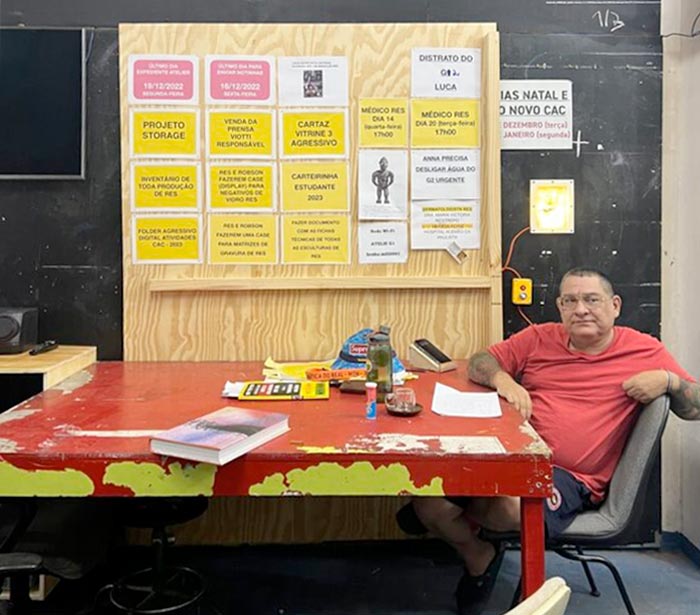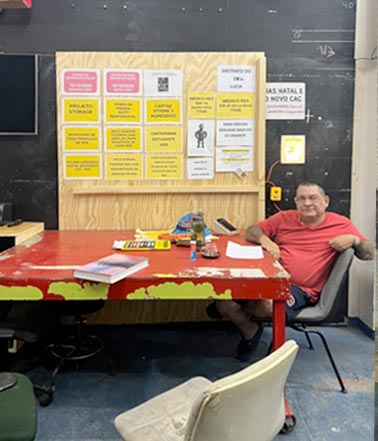
Behind the scenes of a slice of the world of visual arts gained unexpected reach thanks to the podcast The Atelier, project by journalist Chico Felitti. Last year, he became a celebrity on account of The woman in the abandoned house, which reached the position of the second most listened to podcast in Brazil, according to Spotify.
This time, Felitti presents a series of complaints from former students against the Center Atelier, a “school for expanded artistic training”, as the place is defined in its Instagram profile, run by the artist Rubens Espírito Santo.
As in the “abandoned house” in the Higienópolis neighborhood, the journalist starts from a situation without wide public knowledge, such as the Atelier, and from there reveals a complex and unexpected story, based on complaints filed in court by one of the former students of the school, the artist Mirela Cabral, who was there for three years. She claims that, during this period, she suffered physical, psychological and financial abuse in a situation that resembles a sect in which she was obliged to call Espírito Santo master. These are serious allegations, which are being investigated by the Justice.
Due to relationships with important figures in the contemporary art circuit, such as prestigious collectors and directors of cultural institutions, all with names preserved in the podcast, the subject began to be heavily commented on by groups of artists, gallerists, collectors and the like. Who, after all, is the millionaire who would finance the books published about the “master” Rubens Espírito Santo? Who is the collector and banker, father of a participant in the Atelier do Centro, who helps to give status to the place?
These questions are not answered by Felitti, thus avoiding the gossip tone that could contaminate the podcast. On the contrary, he chooses to give visibility only to those who accept having their name made public and invests in contextualizing the case for very current issues, deepening them with specialists, such as the difficulty for people to perceive when they are involved in toxic relationships. After all, it is really difficult to understand just from the reports how the students allowed themselves to be involved for so long in such undignified situations, which is the theme of the sixth episode, one of the best on the podcast, about abusive relationships.
If there is something that in recent years has finally been taken seriously, it is the denaturalization of relationships that have been considered “normal” for so long, but which are in fact constituted by pure harassment, whether physical, moral or sexual. And victims, regardless of their social class, deserve to be treated with respect and discretion.
I was one of those interviewed on the podcast, to contextualize the relevance that Espírito Santo would have in the art circuit and I reaffirm here: none. I tend to believe that he managed to maintain the Atelier do Centro for more than 20 years by taking advantage of the naivety and fragility of those who passed through there.
When looking at this microcosm of the art world, in the end, Felitti chronicles the old Brazil, the one that lost the 2022 elections, but still survives by keeping people enslaved for the grape harvest, which harasses officials, which discriminates against women. at work, who makes prejudiced statements against northeasterners… the list goes on and on.
In the interview given by Rubens do Espírito Santo, in episode nine, his defense is that it was a group of adults, in which any exaggerations occurred collectively and with the consent of the participants.
However, throughout the podcast, Felitti uses various means to point out the behaviors of the “old Brazil” in the studio, from testimonies of former employees, infiltrating art students in the group, interviewing parents of repentant disciples.
At the end, The Atelier it's not just a podcast about a microbubble in the arts circuit. It's more about how a society generates fragile people, who allow themselves to be manipulated easily and who are capable of submitting themselves to unthinkable situations, such as venerating figures who contest the importance of immunization, even if, hidden, they even take the vaccines that they publicly demonize. .













